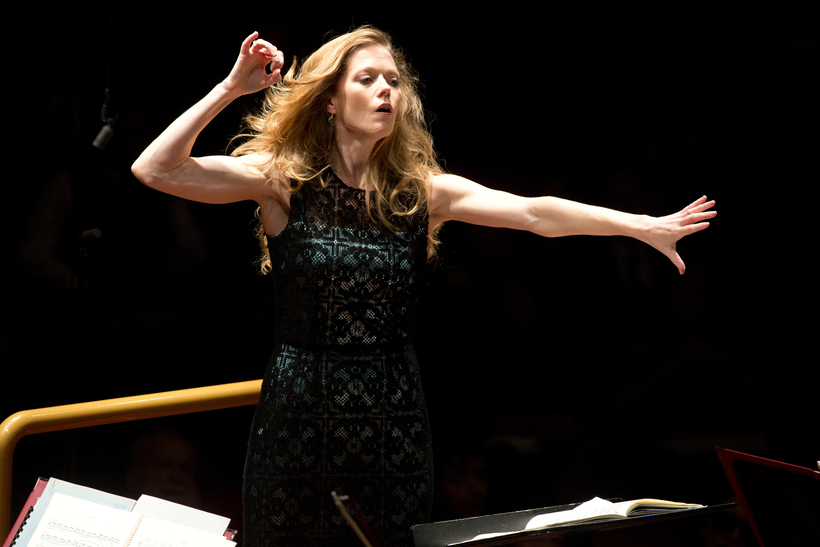The name Barbara Hannigan is not yet mainstream, but those who love music discuss her artistry in worshipful tones, often with the word “genius” affixed. Hailing from Nova Scotia, now living on the northwest coast of France in a town aptly named Finistère (literally, end of the earth), the willowy blonde beauty is not only one of our great sopranos; she is also a conductor of the first rank. Hannigan’s specialty is contemporary music, and next weekend, in Munich, audiences will have the opportunity to experience her derring-do when she both performs and conducts one of the 20th century’s most emotionally naked and musically challenging operas: Francis Poulenc’s La Voix Humaine (The Human Voice), composed to a libretto by Jean Cocteau and premiered in 1959.
Hannigan’s luminous voice possesses the timbre of a flute. Her modest-size instrument focuses emotion, creating an effect deeper and more profound than voices that are more extrovert and throbbing. This quality of distillation, supported by musical acuity and technical excellence, has made her a muse for many of the most important composers of our time.
George Benjamin’s 2012 operatic masterpiece, Written on Skin, was composed for and inspired by Hannigan’s voice, as were works by such major composers as John Zorn, Salvatore Sciarrino, and Henri Dutilleux. In four core soprano roles of the 20th century—Berg’s Lulu, Debussy’s Mélisande, Stravinsky’s Anne Trulove in The Rake’s Progress, and Poulenc’s Elle in La Voix Humaine—she is considered the gold standard.

The musical and emotional complexities of these assignments place musicians well outside their comfort zone. But a thorny score is catnip to Hannigan, who prefers to exist—and to experiment—in the outer realms of expression. “I can’t deny that I love a challenge,” she wrote in our recent e-mail exchange, “but the challenges must have an equilibrium of emotional, intellectual, and spiritual demands.” My point exactly.
In the midst of an international singing career, Hannigan decided to stretch still further: she added conducting to her skill set. In my experience, nearly all performers turned conductors are poseurs who rely on their reputation and the forbearance of orchestras to get them through. Not so Hannigan. In 2010, at the suggestion of Sir Simon Rattle, she began studying with Jorma Panula in Helsinki, who is considered the most exacting and important teacher of conducting in the world. Given her predilections, it will come as no surprise that for her conducting debut, at the Châtelet in Paris in 2011, Hannigan chose Stravinsky’s Renard, a score that terrifies most conductors.
Which brings us to La Voix Humaine. This opera is simply a one-sided phone call, overheard by the audience. The voice belongs to Elle, a woman emotionally and existentially isolated, hanging on the line with the lover who has left her. To successfully sing this score is a major achievement. To successfully sing and conduct it simultaneously is almost beyond imagining. Yet Hannigan’s recent dual performance of the piece in Paris dispelled any doubts.
“When I first performed La Voix Humaine, onstage at Paris Opera,” says Hannigan, “I knew in my heart that there was no telephone and perhaps not even a lover. Taking it into my own hands, as conductor and singer, I needed to stretch the realities even further and give Elle the richest imagination possible.” Her reach left this viewer breathless with admiration and emotion. —Neal Goren
Barbara Hannigan will perform La Voix Humaine at the Munich Philharmonic on May 4 and 5
Neal Goren is a New York–based opera conductor, associate professor at the Mannes School of Music, and the founding artistic director of the Catapult Opera


 Discover
Discover